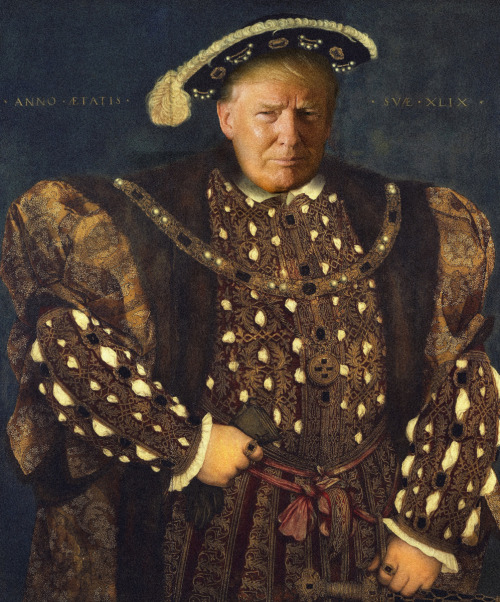
Let’s imagine that Henry VIII fell through a time portal and was elected President of the United States. How would he, and his new subjects, manage?
Well, the good news first. Henry VIII had one undoubted and enviable political skill: he could recognise in others the administrative talents that he himself lacked. If President Henry could quickly identify a Thomas Wolsey or a Thomas Cromwell, he would quickly delegate most of the business of government to that person and the political machine that he (it would definitely be a he) would build up. Most of the time he would leave his brilliant operative alone and take his advice. Stuff would get done and Henry would take the credit.
He would generally temper his wilder ambitions with some realism about what is actually achievable. He would not want to be seen to lose, and so would not take wild risks. He might chafe for military glory, but he wouldn’t embark on something entirely recklessly.
He would stretch the law rather than break it. He would use, circumvent and manipulate the structures available to him, and would bully and overawe opponents rather than, say, hiring assassins. He would want to know in his own mind that what he was doing was legal and right, although he has a remarkable ability to persuade himself that what he wants is indeed justified. But he would be entirely willing to trample norms and conventions when in pursuit of something he really wants, and he would reward those ruthless and cunning enough to find him ways of doing so.
He might, for example, order his military to commit atrocities, although, as he discovered when he gave such an order to a force invading Scotland in 1544, his commanders on the ground might refuse actually to carry them out.
He would be intermittently paranoid. As a result, he would use, and bend, the law vindictively and indeed irrationally to pursue those whom he took against. He would do so pretty implacably. His defeated former presidential opponent, for example, might be well advised not to plan a quiet retirement.
He would find his inability to bend foreign governments to his will infuriating, and would be ready to see - for example - their willingness to protect his critics as a deliberate provocation. Personal snubs, such as failing to turn up to a summit meeting with him, would not be taken well.
Most importantly, perhaps, for those working out how to survive a Tudor administration: he would be an odd mixture of stubbornness and malleability. You can’t tell him he’s wrong, and open opposition only makes him dig in. But if you can sidle up to him and work on him askance, you can often get him to change his mind or shift his priorities. He will never admit that he has changed his mind, and it would be foolish to try to get him to do so, but in fact he is remarkably open to persuasion and indeed manipulation. Just make him think that the idea you have planted in his head is in fact his own idea, and you are there.
A word of caution, though. That malleability does mean he can change his mind for no apparent reason, including turning vengefully on those who were once his trusted intimates. Especially if he starts to feel that he is being pushed around. As Wolsey said: ‘be well advised and assured what matter you put into his head, for you shall never pull it out again.’
Good luck, and hold on tight.